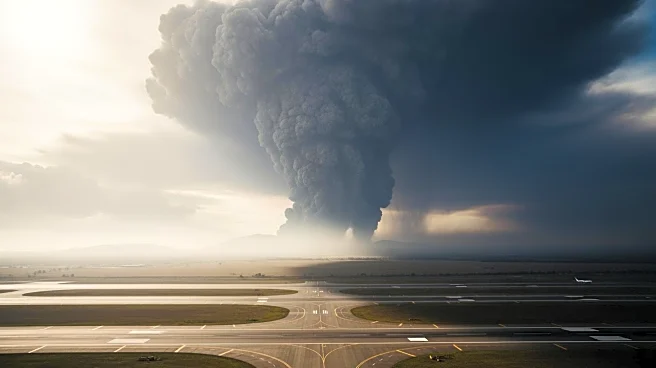What's Happening?
The Hayli Gubbi volcano in Ethiopia, dormant for several thousand years, erupted on Sunday morning, sending a massive ash column into the atmosphere. This ash plume has traveled across the Red Sea, affecting
regions in Oman and Yemen, and has now reached Delhi, India. The eruption has led to significant disruptions in flight operations, with several flights being canceled, delayed, or rerouted. India's aviation regulator has advised airlines to avoid the affected areas due to the hazardous nature of volcanic ash, which can damage aircraft engines and reduce visibility. The India Meteorological Department (IMD) has reported that the ash is unlikely to affect Delhi's air quality, although the skies are expected to clear by Tuesday evening.
Why It's Important?
The eruption of the Hayli Gubbi volcano and the subsequent ash cloud have significant implications for aviation safety and operations in India. Volcanic ash poses a serious risk to aircraft, potentially damaging engines and contaminating airfields. The disruption of flight operations can have economic repercussions, affecting airlines and passengers alike. The situation highlights the vulnerability of air travel to natural disasters and the importance of having contingency plans in place. The incident also serves as a reminder of the interconnectedness of global weather patterns and their impact on international travel and commerce.
What's Next?
Airlines and aviation authorities are closely monitoring the situation, coordinating with international aviation bodies to ensure safety. The Directorate General of Civil Aviation in India has issued advisories for pilots to report any ash encounters and for carriers to inspect aircraft operating near affected zones. As the ash cloud continues to move, further disruptions may occur, and airlines are advised to suspend or delay operations if conditions worsen. The IMD is tracking the ash dispersion and expects the skies over Delhi to clear by Tuesday evening, which should help normalize flight operations.
Beyond the Headlines
The eruption of the Hayli Gubbi volcano underscores the unpredictability of natural events and their far-reaching impacts. It raises questions about preparedness and response strategies for such occurrences, especially in regions not typically affected by volcanic activity. The event also highlights the need for improved monitoring and forecasting technologies to better predict and mitigate the effects of volcanic eruptions on air travel. Additionally, it serves as a reminder of the delicate balance between human activities and natural phenomena, emphasizing the importance of environmental awareness and resilience.











